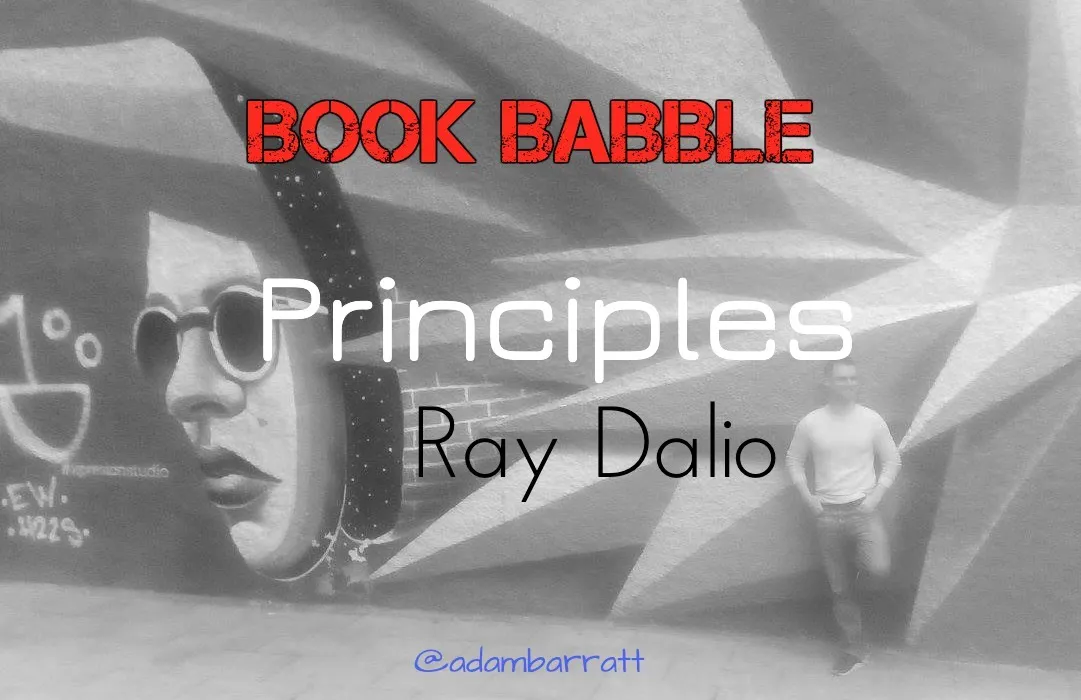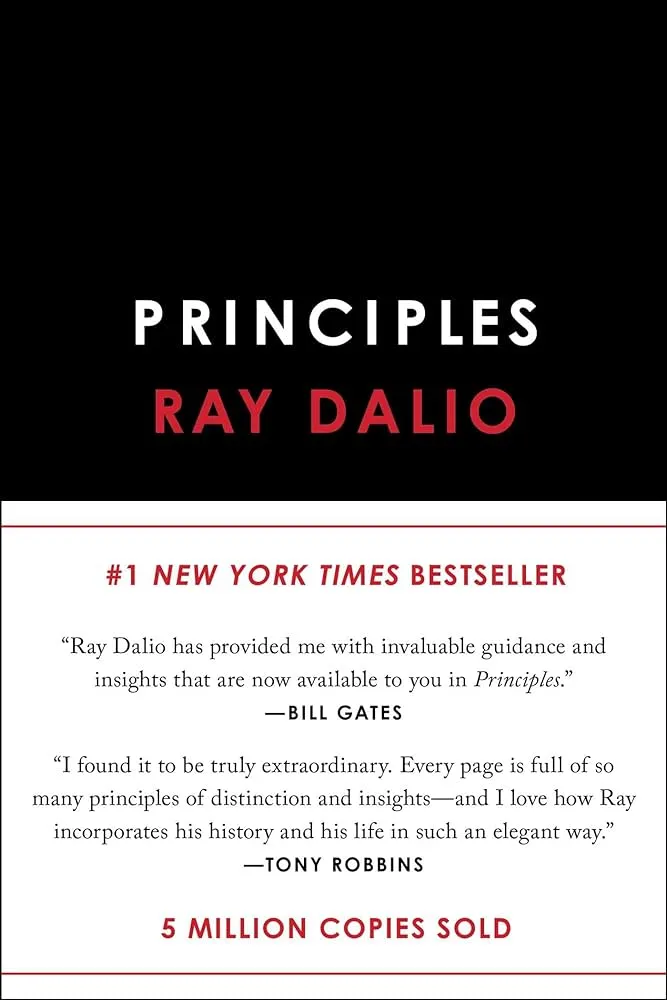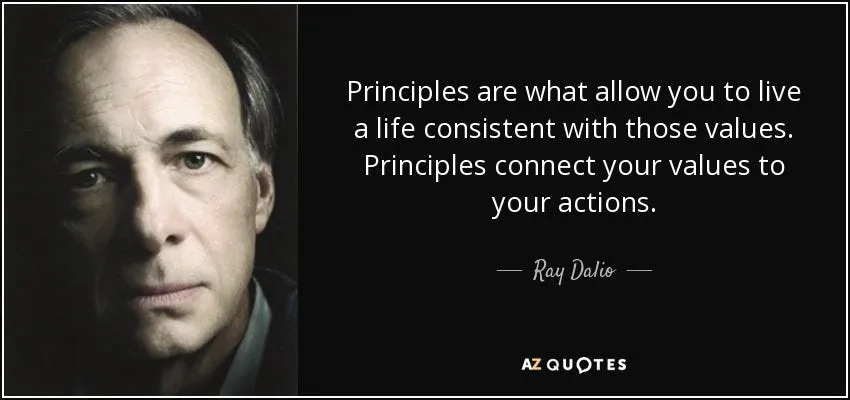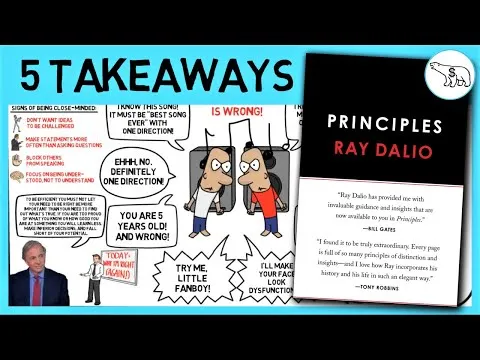The investor and entrepreneur shares his approach to life and work…

This is a bumper book by the billionaire money manager and is a comprehensive guide that distills the lessons learned over his life and career. Dalio is the founder and Chief Investment Officer of the world's largest hedge fund, Bridgwater Associates.
Part memoir and part practical guide, these are the principles he lives and works by and that wisdom is offered to us here to use as we will. There are three main parts – his own background, life principles, then work principles.
Let's elaborate on those 3 sections first…
1. Personal Background & Journey
The books starts off with Dalio sharing his personal back-story; his upbringing in Long Island on to the founding of Bridgewater Associates, which as I mentioned, is one of the biggest out there. He reflects on the mistakes and successes that shaped his thinking and philosophy which have influenced his practices.
2. Life Principles
Now we get into the juice. In this section, he presents a set of guiding principles that have helped him in his personal life. These include:
- Embrace reality and deal with it: Accepting and confronting harsh realities instead of avoiding them.
- Use pain to guide progress: Learning from mistakes and using failures as a springboard for improvement.
- Radical truth and transparency: Promoting honesty and openness in relationships and decision-making.
- Ego and blind spots: Understanding how one's ego can cloud judgment and seeking out others' perspectives to avoid biases.
3. Work Principles
Now we transition to principles that are specifically tailored for organisations and business environments:
- An idea meritocracy: Creating an environment where the best ideas win out, regardless of who proposes them.
- Meaningful work and meaningful relationships: Building a culture that values and fosters both productive work and strong interpersonal relationships.
- Process of decision making: Developing a systematic approach to decision-making that combines logic, evidence, and the input of others.
- Hiring right: Placing emphasis on finding the right people who align with the organisation's culture and goals.

Top Takes: some quotes from the book, followed by my thoughts
I've got far too many parts highlighted in the book so can't feature them all (or that many), but I'll pick out a few at random…
If you can think for yourself while being open-minded in a clearheaded way to find out what is best for you to do, and if you can summon up the courage to do it, you will make the most of your life.
Keep a clear path and a clear mind. Have your own set of principles, work things out for yourself, and act from that point. However, be sure to be open to other opinion and ideas, and flexible enough to incorporate it or adjust where it makes sense.
I believe that the key to success lies in knowing how to both strive for a lot and fail well. By failing well, I mean being able to experience painful failures that provide big learnings without failing badly enough to get knocked out of the game.
Fail fast, learn and move on. Don't avoid it, or you'll avoid any kind of success at all. A failure is a learning experience, and the sooner the better so you can change and improve your approach. Don't take it too personally, stay in the game, and let it drive you on. Plus you've never actually failed unless you give up.
Systemize your decision making
We always drop to the level of our systems. We can also be a little indecisive which is a killer for all progress. With systems - and habits - in place, we know exactly what the process is in a given situation.
Ask yourself what you want, seek out examples of other people who got what they wanted, and try to discern the cause-and-effect patterns behind their achievements so you can apply them to help you achieve your own goals.
Find what has worked for others and find the patterns and approach that be tailored to your goals. Many people have walked the path before, so we can use their experience wisely.
Meditation has benefited me hugely throughout my life because it produces a calm open-mindedness that allows me to think more clearly and creatively.
We all should be meditating in some shape or form, as the benefits are difficult to ignore, and it's not a tough ask. Not easy (at least at first), but it's not complicated or need any equipment or a lot of time. This gets glossed over, but it's such a 'simple' act that can be a real 'lead domino'.
Timing is everything
It's not just about being great, a lot does come down to a bit of luck and just plain timing. The best inventions sometimes appear too early, and or course being too late means you missed the boat. There's a sweet spot, and whilst we do have influence, some things are out of our control.
Imagine that in order to have a great life you have to cross a dangerous jungle. You can stay safe where you are and have an ordinary life, or you can risk crossing the jungle to have a terrific life. How would you approach that choice?
It's a toughy without an obvious answer. There's no right or wrong, just what's 'right' for you at a given time, and whether you're prepared to do all it takes to take the grander path. We all crave security and rightly so, but we also crave the bigger and better life. And there will always be doubts when we take that route and massive questions… so what to do?

I came to see that people’s greatest weaknesses are the flip sides of their greatest strengths
It's the great dichotomy. What makes people amazing in one sense is going to make them 'lacking' in some other areas. So you either have more 'all-rounder' types or you take the rough with the smooth, people excelling in one area, and other people who do well in other areas. It's all in how these things are used, making the most of said strengths and compensating for any weaknesses.
There is nothing to prompt learning like pain and necessity
Necessity is the mother of invention, and pain brings change. Without these you just kind of drift on as is, because why change? When things are really bad, that's when we're truly motivated for action.
To me, the greatest success you can have as the person in charge is to orchestrate others to do things well without you
You have to be able to remove the 'boss' in a given situation and everything to run smoothly. That is a true leader in fact, the ability to create other leaders rather than people who simply follow orders. Making people self-reliant and take responsibility where needed.
What I have seen is that the happiest people discover their own nature and match their life to it
The key to life right there! Fitting what you 'do' with who you are, rather than trying to fit who you are into some pre-defined boxes that don't make you come alive. Finding that sweet spot not only helps the person in question, but any organisation or society at large.
Contribute to the whole and you will likely be rewarded
At some point and at some time, it just makes sense. Maybe not immediately or when expected but continued contribution to a larger course is going to benefit other individuals and will trickle back to the person who made meaningful contributions.
No matter what you want out of life, your ability to adapt and move quickly and efficiently through the process of personal evolution will determine your success and your happiness.
Adaptation is key. I don't want to quote Darwin again, but I will paraphrase anyway - it's those who can adapt to change that will win (not the smartest or strongest… then again if you're smart, you may learn to be adaptable).
1.8 Weigh second- and third-order consequences
This could be the subject of another article… second and third order consequences. Most just see the first; the transaction of one thing out and one thing in. But there are always knock on effects, and they could be huge (and unseen, at least to a degree)… and brings much bigger impacts.
creative genius often exists at the edge of insanity
The 2 are inextricably linked ;)
There are 100s of these and we could go on all day, but have a read of the book for more insights! Meanwhile, check out a video review by The Swedish Investor on YouTube…
Thanks Ray! Anything Else?
Throughout the book we come back to a couple of key overall points which is worth a review:
- 5-Step Process: Dalio's method for achieving goals, which involves setting clear goals, identifying problems, diagnosing root causes, designing solutions, and executing them effectively.
- Believability-weighted decision making: Weighing the opinions and decisions of those with proven track records more heavily than others.
He wraps up by emphasising that anyone can develop their own set of principles, each tailored to their own unique values and experiences. Those can then guide them toward success in both life and work.
We should think deeply about how we can apply what we've learned in this and other books, as well as form our own guiding lights which keep us on track and make us who we are.
Have you read it, and do you have your own principles?
First image my own, other images and video linked to source
- 1-50: First 50 BookBabbles
- 51: THE DAILY STOIC - Ryan Holiday
- 52: MAKE TIME - Jake Knapp & John Zeratsky
- 53: GRIT - Angela Duckworth
- 54: WHAT I TALK ABOUT WHEN I TALK ABOUT RUNNING - Haruki Murakami
- 55: THE PURSUIT OF PERFECT - Tal Ben-Shahar
- 56: THE SLIGHT EDGE - Jeff Olson
- 57: CONTAGIOUS - Jonah Berger
- 58: THE RICHEST MAN IN BABYLON - George S. Clason
- 59: THE 5 AM CLUB - Robin Sharma
- 60: THINK LIKE DA VINCI - Michael Gelb
- 61: INFLUENCE - Robert Cialdini
- 62: THE ONE THING - Gary Keller
- 63: THE 12 WEEK YEAR - Brian Moran & Michael Lennington
- 64: THE POWER OF YOUR SUBCONSCIOUS MIND - Joseph Murphy
- 65: THE UNTETHERED SOUL - Michael A. Singer
- 66: ON WRITING WELL - William Zinsser
